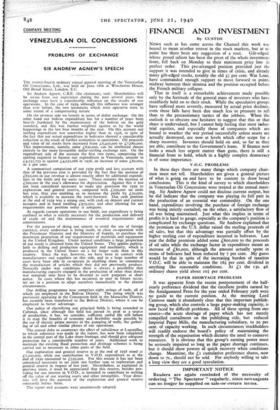COMPANY MEETING
VENEZUELAN OIL CONCESSIONS
PROBLEMS OF EXCHANGE SIR ANDREW AGNEW'S SPEECH
THE twenty-fourth ordinary annual general meeting of the Venezuelan Oil Concessions, Ltd., was held on June i8th at Winchester House, Old Broad Street, London, E.C.
Sir Andrew Agnew, C.B.E. (the chairman), said : Shareholders will be aware from our experience during the past several years that exchange rates have a considerable influence on the results of our operations. In the case of 1939, although this influence was stronger than ever before, the two tendencies which were operative were to some extent of a compensating nature.
On the revenue side we benefit in terms of dollar exchange. On the other hand our bolivar expenditure has for a number of years been heavily burdened by the maintenance of the bolivar on the gold standard, and this was further weighted against us by the world happenings in the last four months of the year. On this account our sterling expenditure was somewhat higher than in 1938, in spite of the fact that our actual expenditure in bolivares showed a considerable reduction as the result of further economies in operations. Oil prqceeds and value of oil stocks have increased from £6,450,000 to £7,080,000. This improvement, namely, some £63o,000, can be attributed almost entirely to the more favourable dollar-sterling exchange rate. On the expenditure side of the account the first two items, comprising the sterling required to finance our expenditure in Venezuela, amount to £4,131,733 as against £4,051,086 in 1938, an increase of some £8o,000, or 2 per cent.
A summarised comparison of our 1939 profit and loss account with that of the previous year is provided by the fact that the increase of £63O,000 in our revenue is almost exactly offset by additional expendi- ture in the fields and for extra taxes. There remains the increase of Lioo,opo in the year's allowance for depreciation. Against this it has not been considered necessary to make any provision for 1939 to exploration and general reserve, compared with £250,000 set aside last year, thus also enabling us to increase the profit by £5o,000, which is available to increase the carry-forward. Our cash position at the end of 1939 was a strong one, with cash on deposit and current accounts and in hand totalling £953,000, and after allowing for net requirements our position today is adequate.
As regards current operations in our fields, our expenditure is being confined to what is strictly necessary for the production and delivery of crude oil and the maintenance of essential requirements and commitments.
For the purpose of doing our utmost to avoid the use of foreign currency, every endeavour is being made, in close co-operation with the Petroleum Ministry and the Ministry of Supply, to purchase the maximum proportion of our requirements of materials and equipment in the United Kingdom. Under normal conditions a large proportion of our needs is obtained from the United States. This applies particu- larly to drilling and production equipment and machinery, which is produced in the United States on a far larger scale than in this country. Since the war, however, we have been in contact with manufacturers and suppliers on this side, and in a large number of cases have been able to co-operate in enabling them to commence the manufacture of articles which they did not previously produce. Naturally under war conditions there is always a possibility that manufacturing capacity engaged in the production of other than direct war materials may have to be diverted to such purposes at short notice. In cases where this has occurred, or may in future occur, we are in a position to adapt ourselves immediately to the altered circumstances.
Our drilling programme now comprises eight strings of tools, all of which are employed in the Bolivar District. The string which was previously operating in the Concepcion field in the Maracaibo District, has recently been transferred to the Bolivar District, where it can be employed to better advantage.
Our policy of electrifying our principal fields is being extended to Cabimas, since although this field has passed its peak as a source of production, it has, we consider, sufficient useful life still before it to reap the benefits of economy and flexibility made possible by the use of electric prime movers in the pumping of wells, the gather- ing of oil and other similar phases of our operations.
The coastal dyke to counteract the effect of subsidence at Lagunillas, to which reference was made in the report, has now been completed in the central part of the Lake shore frontage, and should give adequate protection for a considerable number of years. Additional work to maintain the existing flood protection and drainage schemes is being carried out as necessary in other parts of the field.
Our exploration and general reserve as at the end of 1938 stood at £1,000,000, while our contribution to V.O.D. expenditure as at the end of 1939 amounted to £55o,000. For this reason it has not been considered necessary to set aside any further sum to exploration and general reserve in respect of last year. Nevertheless, as explained in previous years, it must be appreciated that this reserve, besides pro- viding for our interest in V.O.D., is intended to contribute to writing off the value of our wasting assets and other intangibles. Your direc- tors will have the question of the exploration and general reserve constantly before them.
The report and accounts were unanimously adopted.






























 Previous page
Previous page